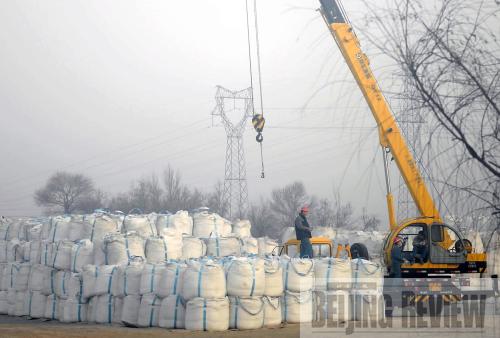|
"It is inevitable that the Chinese Government adopts measures to prevent a resource drain and protect the environment," said Li Gang, a researcher at the Chinese Academy of International Trade and Economic Cooperation of MOFCOM.
 |
|
ZHANG LING PRECIOUS CARGO: Inner Mongolia Baotou Iron and Steel (Group) Co. Ltd. workers unload rare earth materials |
Additionally, China no longer needs to reserve foreign exchange at any cost as it was forced to in past decades. In the late 1970s and early 1980s, China faced serious shortages of materials and foreign exchange. In 1978, China's foreign exchange reserve stood at only $167 million. The government explored any means necessary to encourage exports and increase China's foreign exchange reserve. Before the mid-1980s, primary resources became the largest exported products, with crude oil becoming the most important source of foreign exchange revenue. Non-ferrous metals, ferrous metals, electricity and coal also topped the list.
Not contrary to WTO rules
Concerning the WTO legal action that the European Union and the United States have brought against China, Li thinks that China's restriction on rare metal exports does not violate WTO rules.
"In the multilateral trade system of the WTO, there are no strict regulations on how a country will restrict its exports. Moreover, in our protocol on the accession to the WTO, we didn't make such commitments," said Li.
In fact, China is not the only country that is strengthening its protection efforts on rare metal resources. The United States is home to a variety of mineral resources, with some of the largest reserves in the world. However, in order to protect its own resources, the United States has closed a large number of mines and adopted policies to import rare metal products from other countries. Since 1999, the United States has gradually ceased exploitation of its own rare earth resources. South Korea also decided to increase its rare metal reserves by means of cooperation between official and non-official channels.
"It's unreasonable for the United States and Europe to throw stones at China. All the countries are protecting their own resources, so why can't China?" Li continued.
Rapid economic growth has increased China's need for more resource reserves, but China has faced a shortage of natural resources because of over-exploitation.
According to statistics from the China Nonferrous Metals Industry Association, China's rare earth reserves have been reduced from 85 percent to 58 percent of the world's total. Almost all of China's black tungsten mines have run out, with only white tungsten providing enough for exploitation over the next 20 years. If exploited at their current rate, the country's molybdenum resources will only be enough for 16 years, stannum for 12 years, zinc for 10 years and antimony for six years.
Major Rare Metals in China
Rare earth: Also called the "gourmet powder" of hi-tech industries. Adding rare earth to iron and steel as well as ceramics greatly changes the characters of these materials. Nuclear magnetic resonance imaging systems, hard disk drives, magnetically levitated trains and many other devices utilize rare earth. Rare earth is of considerable military significance because night vision devices, tank shells and airplane engines also rely on this material. China has the largest reserve of rare earth in the world.
Indium: It is mainly used in flat displays, semiconductor data transmission tools and the manufacturing of space products. China's indium reserves rank first in the world.
Tungsten: It is mainly used in products such as hard alloy and special steel, and is also widely used in mechanical processing. The defense and space industries utilize this rare metal, calling it the "tooth of the industry." China, with the largest tungsten reserves in the world, supplies 85 percent of the world's tungsten demand.
Germanium: It is mainly used in the production of night vision devices, heat vision devices, activators for petroleum products and solar cells. It is also widely used in the field of fibre-optical communication. China has the largest germanium reserves in the world, with its output accounting for 50 percent of the global total.
Molybdenum: It is mainly used in the smelting of alloy steel, stainless steel, heat-resistant steel and super alloys. Widely used in the military industry, it has earned the nickname of "the metal for war." China has the second largest molybdenum reserve in the world.
| 